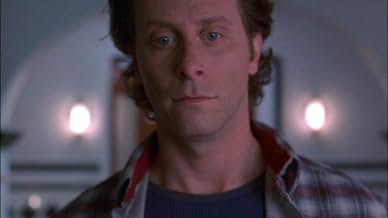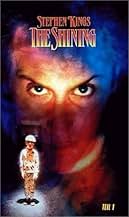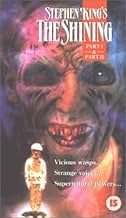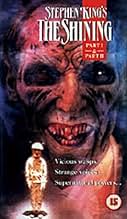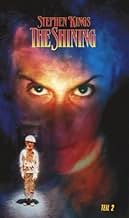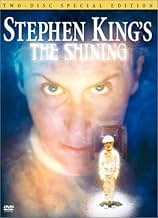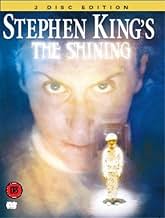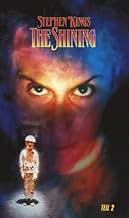Un alcolizzato in via di guarigione deve lottare con i demoni interni ed esteriori quando lui e la sua famiglia si trasferiscono come custode in un hotel infestato.Un alcolizzato in via di guarigione deve lottare con i demoni interni ed esteriori quando lui e la sua famiglia si trasferiscono come custode in un hotel infestato.Un alcolizzato in via di guarigione deve lottare con i demoni interni ed esteriori quando lui e la sua famiglia si trasferiscono come custode in un hotel infestato.
- Vincitore di 2 Primetime Emmy
- 15 vittorie e 10 candidature totali
Sfoglia gli episodi
Trama
Lo sapevi?
- QuizStephen King: Author plays Gage Creed, the band conductor. Gage Creed is also the name of the 2-year-old boy played by Miko Hughes in Cimitero vivente (1989), also based on a book written by King. King also had a cameo in Pet Sematary.
- BlooperReflected in the Overlook's main doors, behind Watson.
- Citazioni
[Addressing the Overlook Hotel]
Dick Hallorann: Hello, you old bitch. You're just as ugly in wintertime as you are in summertime.
- Versioni alternativeDVD contains 11 deleted scenes:
- Danny at the doctor's office; they briefly discuss Tony.
- Brief scene with Danny and Jack conversing.
- A brief scene where the Torrences step outside the hotel and observe that they are snowed in.
- A scene which originally occurred after the "217 lady" scene. Jack says that Wendy and Danny can leave the hotel ASAP and that he will stay. He also shows Wendy the lipstick he found, and describes how he believes Danny's strangle wounds were self-inflicted.
- A fireside chat between Wendy and Danny, in which he tells her that he hears the ghosts in the hotel, talking, laughing, and screaming.
- Two scenes which originally occurred after Jack is locked inside the vault. Wendy leaves Danny to get some food, and Danny tells her that he called to Dick. Then a scene in which Wendy returns and Danny says that Dick may not have heard him.
- A brief scene showing Grady releasing Jack from the vault, and Jack exiting and grabbing the mallet.
- A brief scene in which Danny encounters a female ghost, and he tells her he isn't afraid of her, that only his father can hurt him now. The ghost vanishes, and Jack then appears to "punish" him.
- A climatic ballroom scene in which the "party guests" and the orchestra all melt in gruesome fashion.
- An outtake featuring orchestra conductor Gage Creed (played by Stephen King) melting in gruesome fashion.
- ConnessioniFeatured in The 49th Annual Primetime Emmy Awards (1997)
Recensione in evidenza
A single statement: No film will be done justice if produced for a network. The censorship laws will simply not allow it. This is why I'm so perplexed as to why Stephen King has done two of his most prolific novels ("The Stand" and "The Shining") through network miniseries format. There's also one other reality our dear Mr. King is going to have to realize: While cornering the market on the written word, King's ideas fall as flat as two-day old soda on the big screen. The horrific adaptation of "Pet Sematary" and the cornball delivery of "The Stand" are just testaments that SK's books should remain locked in the binding. "The Green Mile" is the ONLY true-to-book adaptation of a King novel, and that's just because the director and studio deemed it necessary. I have heard an exorbitant amount of comparison between the miniseries "The Shining" and the Kubrick film, or the lack thereof, to be more precise. King has often said that he didn't like the 1980 film, and it should be used as an example of how not to make a horror film. King should realize that Stanley Kubrick's "The Shining", while deviating from aspects of the author's story and changing the end, is still better than his own vision of the adaptation. As a King fan, one becomes aware of a certain mystique that makes his books addictive. However, seeing his films make one realize that King has quite a different opinion on the delivery of his work, as opposed to the darker opinions of his readers. In 1980, Stanley Kubrick presented the world with the first epic horror film. The fact that he changed the story and ending are dismissable, simply because Kubrick removed the useless flab from a mass of back story and (forgive me) somewhat cheesy happenings in the Overlook. The Kubrick film is better for two reasons: 1) It's a dark, moody descent into madness. The cinematography in Kubrick's film is revolutionary. King's own brainchild is lumbering and standard fare. 2) The ending of Kubrick's film is simply better. It's incredibly distrubing, whereas King's thoughts on the end of Jack Torrance's odyssey are somewhat... more redeeming. One gets the idea from Kubrick that the Overlook's evil is insurmountable and, indeed, necessary. King's conclusion is the common end of good overcoming evil, etc. End result -- When it's Kubrick vs. King, good ol' Stanley (R.I.P.) comes out on top. Regardless of whether King originated the story, Kubrick delivered it to glory, and made it an instant classic. King merely proved he could make a version of the film himself, and make the effort seem completely unnecessary in the process.
- kilgres_bloodmoon
- 5 lug 2000
- Permalink
I più visti
Accedi per valutare e creare un elenco di titoli salvati per ottenere consigli personalizzati
Dettagli
- Data di uscita
- Paese di origine
- Lingua
- Celebre anche come
- The Shining
- Luoghi delle riprese
- Aziende produttrici
- Vedi altri crediti dell’azienda su IMDbPro
- Tempo di esecuzione1 ora 31 minuti
- Colore
- Mix di suoni
- Proporzioni
- 1.33 : 1
Contribuisci a questa pagina
Suggerisci una modifica o aggiungi i contenuti mancanti

Divario superiore
What is the Canadian French language plot outline for Stephen King's Shining (1997)?
Rispondi

